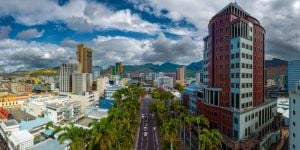
The International Workplace Group (IWG) surveyed over 1000 hybrid workers about their work expectations. Nearly 60% reported that they are planning to work from anywhere around the world this year, with two-thirds saying their productivity doesn't depend on location. Since Covid, remote working and digital nomadism have soared. Hyper flexibility and workforce dispersion are becoming normalized within companies.
Hybrid work since 2020
The Covid-19 pandemic has completely changed how people work. Sanitary lockdowns have forced employees to become remote or hybrid workers in 2020 and 2021 – with no workers coming to the office at all (remote) or employees coming to the office in small numbers and on weekly rotation (hybrid).
Envoy, an American visitor management platform, surveyed 8000 companies in April 2022. They found out that 77% of these companies had switched to hybrid work, and 56% were letting their employees have an “at-will schedule,” i.e., one where employees can choose “when and how often they wish to come into the office.” Only 15% of workplace leaders required all employees to work at the office after lockdowns were lifted.
The data from the International Workplace Group (IWG) corroborates that from Envoy. Indeed, 71% of the workers surveyed by IWG said they now only consider jobs that give them a degree of flexibility over where they can work. Three quarters report that they prefer accepting a job offer from a company that allows them to take “flexcations” or “workations” where they can combine work and leisure travel.
Similarly, the 2021 survey of IWG also revealed that nearly 50% of workers would quit if they were ordered by management to return to their pre-pandemic 9-to-5 and 5-days-a-week in-office routine. The priorities and expectations of workers have shifted with the Great Resignation in the US. Workers, who now have more power in a market where vacancies exceed candidates, value mental health, wellness, autonomy and flexibility in addition to traditional criteria like salary and job title.
What are “workations”?
According to Human Resources Director magazine, a “workation” is a trip away from home during which a worker still performs “their full output of work-related tasks.” The trip can last a few weeks or months, and it can be made within the same country (e.g., at a countryside getaway) or in a completely different country. With rapid internet in most countries, cloud-based workflow and project management systems, and a wide variety of videoconferencing apps (Microsoft Teams, Zoom, Skype, VooV, etc.), workations have become very feasible.
Workations offer the best of both worlds. The “vacation” aspect offers the opportunity to relax, discover a new part of the world, and take care of one's mental health. The “work” aspect allows the employee to be productive from any corner of the globe as well as come up with fresh, creative ideas that a new environment can make them generate more easily.
Many large corporations are now allowing their employees to take workations. For example, the accounting giant PwC announced in December 2021 that its staff in eight countries (US, UK, Ireland, India, Malaysia, South Africa, New Zealand, Philippines) can now work remotely – including while traveling – for eight weeks per year.
Other corporations with recent similar policy changes are Lyft, Reddit, Spotify, Twitter, Vista, Atlassian, Coinbase, and Zillow. Many are tech companies and experts in using computers to coordinate remote working in teams. Jobs offering such flexible working conditions have increased from 13% to 26% in 2022 (IWG).
Working abroad and digital nomad visas
The uptick in international travel generated by hybrid workers and their workations needs to be supported by good transport links (e.g., regular flights, high-speed rail networks), workation packages at hotels and resorts, good internet coverage and speed, interesting downtime activities in the workation spots, efficient time zone management, and digital nomad visa programs.
In order to revive tourism after the pandemic, many countries have created digital nomad visas. Nomad Girl has a comprehensive list of 46 countries worldwide offering digital nomad visas in 2022. They range from Georgia, Croatia and the Czech Republic in Eastern Europe, to the small nations of Barbados, Anguilla and Bermuda in the Caribbean, to African islands like Mauritius, Seychelles and Cape Verde, to major Asian tourist hotspots like Thailand and Bali (Indonesia), to large countries like Colombia, Brazil and South Africa, to European states like Iceland, Italy and Estonia.
These visas generally allow remote or hybrid workers to stay for a year, under the condition that they earn a minimum income from abroad. Many of these host countries had robust tourism industries before the pandemic, which means that they already have the infrastructure in place to host digital nomads – many hotels/resorts, an international airport, etc.
Workforce dispersion, which IWG says is a major current and future trend in the professional world, favors a ‘hub-and-spoke' model. It means that aside from having an HQ, companies also now have ‘satellite' hubs which are easier for employees to travel to. They will only need to visit the HQ from time to time – in certain cases, only a couple of times a year. This decentralized model allows more workers to work from abroad. And indeed, the interest in working abroad is higher than ever. Two studies by American Express and TUI UK revealed that over half of workers would welcome a workation.
There are some challenges associated with this new way of working – such as scheduling team meetings for employees in different timezones or communicating clearly about timelines without meeting face-to-face – but it can be done with the proper planning and use of cloud technology. The advantages gained – such as reduced commute time, less money spent on renting corporate offices, more green dividends from reduced office usage, happier employees – are worth tackling the challenges for.



















